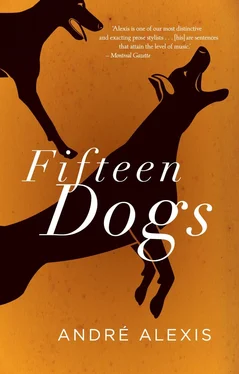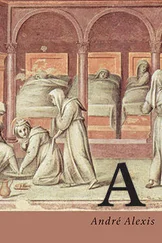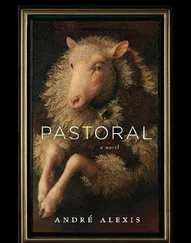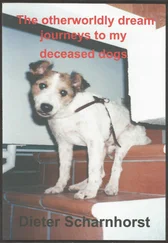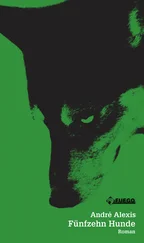Running through the grey-eyed dawn
with last night’s trash in mind,
the brown dog scuttles
through fluted gates
while birds sing on above the world
about a bit of fallen cheese,
the shish kebob he ate
and all the vagaries of plates
that wait for him at home.
And yet, there was something. Prince’s wit, his playfulness, was a curious element within him, a glittering depth. It was this, in the end, that the god of thieves had chosen to protect. Prince’s spirit was a kind of quicksilver. The dog was as liable to die happy as it was to die miserable.
+
Prince was whelped in Ralston, Alberta, a mutt born to mutts born to mutts. It was impossible to say what breeds he had within him. He was medium-haired, russet-coloured with a white patch that covered his chest. There was almost certainly some golden retriever in him, and perhaps a touch of border collie. Not that his breeding mattered to the family that took him in. It certainly didn’t matter to Kim, the youth who fed him, walked him, chased him across the prairie and hunted gophers with him.
Prince’s character was partly innate, but it was also tempered by Kim, who encouraged his playfulness and his intelligence, and by Alberta itself, which, in its way, created him in its image. That is, the land allowed Prince to be a dog in a way that Albertan dogs are. For two years, Ralston was his home and his entire domain. He loved everything about it and about his life: from the way the prairie smelled in summer to the taste of his canned dog food, from the startling crack of a.22 rifle to the prospect of chasing down a wounded rodent, from the smell of Kim’s bedroom to the affection he received from the entire family. In every way, the first two years of Prince’s life were idyllic.
Then came exile. Kim moved from Ralston and took Prince with him. The journey itself was progressively distressing. They left on a cold morning in spring. It was early, but Prince imagined they were going to hunt rabbits and he was thrilled. The atmosphere was strange, though. It was unusually tense, and Prince could feel that Kim’s mother was upset. Still, Kim’s mother was often upset for no reason Prince could see, so he jumped into the car, excitedly sniffing at the air to get a whiff of rodent, ignoring the sound of her weeping and the peculiar stiffness of the family’s demeanour.
Kim, in a shirt that smelled of soap and motor oil, left the window cracked open, so Prince, sneaking the tip of his nose out, could smell the dew-wet ground as the sun burned away the morning. How exhilarating it was! But then, familiar smells gave way to unrecognizable monotony: tar, dust, rock. The world began to look different. The beautiful distances of home become an increasingly oppressive closeness. And it began to seem as if they would never stop to hunt. Kim allowed him out of the car — on a leash — so he could pee in a small patch of lawn somewhere in the middle of a world that smelled of gasoline. They ate, eventually, and slept in the car before setting out again.
From there, the world grew more and more unknown: its sounds, its odours, the look of it as it flew by. All that Prince loved seemed to have vanished, leaving tall buildings, passing cars, an emptiness disguised as plenitude. They had reached the city.
Then, the city — which, in Prince’s first days, was constantly bewildering — took Kim away from him as well. Perhaps, if Prince had had time to learn how to navigate the seemingly endless, linked mazes that made up the new world, he might have found Kim again. But he had not had time and, what’s more, he could not understand how Kim could disappear. They had been wandering in a ravine through which a small river ran. There were trees and birds and, fatefully, squirrels. One moment, he and Kim were walking together, the next Prince was chasing a squirrel that ran up a side of the ravine.
The last he heard of Kim was
— Prince! Stay! Stay!
Kim was using his serious voice. In most circumstances, Prince would have returned to him at once. But the squirrel in question was insolent. It positively wanted biting. And then the trees and water, the smell of a world he thought he recognized: these things filled him with pleasure. Just running as he did, as fast as he could, was an exhilaration he was not certain he would ever feel again. It was all a wonderful game! So he’d run up the side of the ravine, where Kim couldn’t easily follow, and then explored strange streets, going among houses that smelled of onions, paint and cooked flesh.
After a time, he stopped exploring. The game had finished. He began looking for Kim, but a door to one of the houses had opened and a woman had called him in and given him water and biscuits. How long he stayed at this house, he could not have said. He had barked to get out, but she had put him on a leash, taken him out for a walk, and kept him. Days or, perhaps, weeks later, he managed to get away. Naturally, he searched for Kim, but all trace of Kim was gone. Prince had wandered far from the ravine and he was lost in a bewildering maze of streets, bedevilled by sensations that were new and distracting.
The days that followed were grim. Even in Ralston — of which he’d known almost every inch by feel or smell — Prince could not be certain of human kindness. There’d been people around who’d chase him or throw stones. He’d gotten to know the worst of those and avoided them. But here, in this city, he did not know whom to avoid. So, he avoided all of them until hunger or thirst forced him to approach and beg.
Were it not that Prince had lost everything, you might say that he was, from here on, fortunate. After a week scrounging in the streets, overturning garbage cans, eating whatever he happened to find on the ground, he was taken in by a couple who treated him well. They fed him, gave him water, allowed him to stay in their home. He was disinclined to stay with them, whenever he remembered Kim, but at least they did not try to hurt him. They allowed him in or out of their house. So he returned to them.
They weren’t entirely trustworthy, though. It was they who left him overnight in the clinic at King and Shaw.
+
The change affected Prince differently than it did any of the other dogs. Or it affected him more, in a rather specific way. Prince began to think about language, almost from the moment the change occurred. Names and naming seemed extraordinary to him and extraordinarily useful. It was an abstract idea, assigning a sound or a cluster of sounds to a thing. The concept wasn’t foreign, of course. He associated the word treat with biscuits. In fact, this very association may have been at the root of his joy in language.
Whatever influenced his thinking about names and naming, however, he was not one to take anything too seriously. It was not his nature. He was the first creator of puns in the new language, as we’ve seen. But he was also the creator of one-liners and riddles. For instance
— How is a squirrel like a plastic duck?
— They both squeak when you bite them.
or, more metaphysically,
— Why do cats always smell like cats?
— Oh look! A squirrel!
To the casual listener, some aspects of Prince’s jokes will, no doubt, be difficult to appreciate. To begin with, the first of anything is likely to be overwhelming, and these jokes, being the first in the pack’s language, were not so much enjoyed as contemplated and admired. (By all the dogs.) The first one about the squirrel, for instance, seemed to be both true and fanciful, a correlation of things not usually correlated. Then there was the joke’s linguistic mark: the word for ‘squirrel’ was extremely pleasurable to say. (All agreed about this as well.) Finally, there was Prince’s performance. He needed to be heard in order to share the joy he took in language, but none of the other dogs were used to listening to the kinds of things Prince had to say. To hold their attention, Prince’s demeanour, his diction and his delivery all had to be compelling. Although he’d had no previous experience as a raconteur, Prince invented a new manner of storytelling. It was for this that he was loved by those who loved him.
Читать дальше
